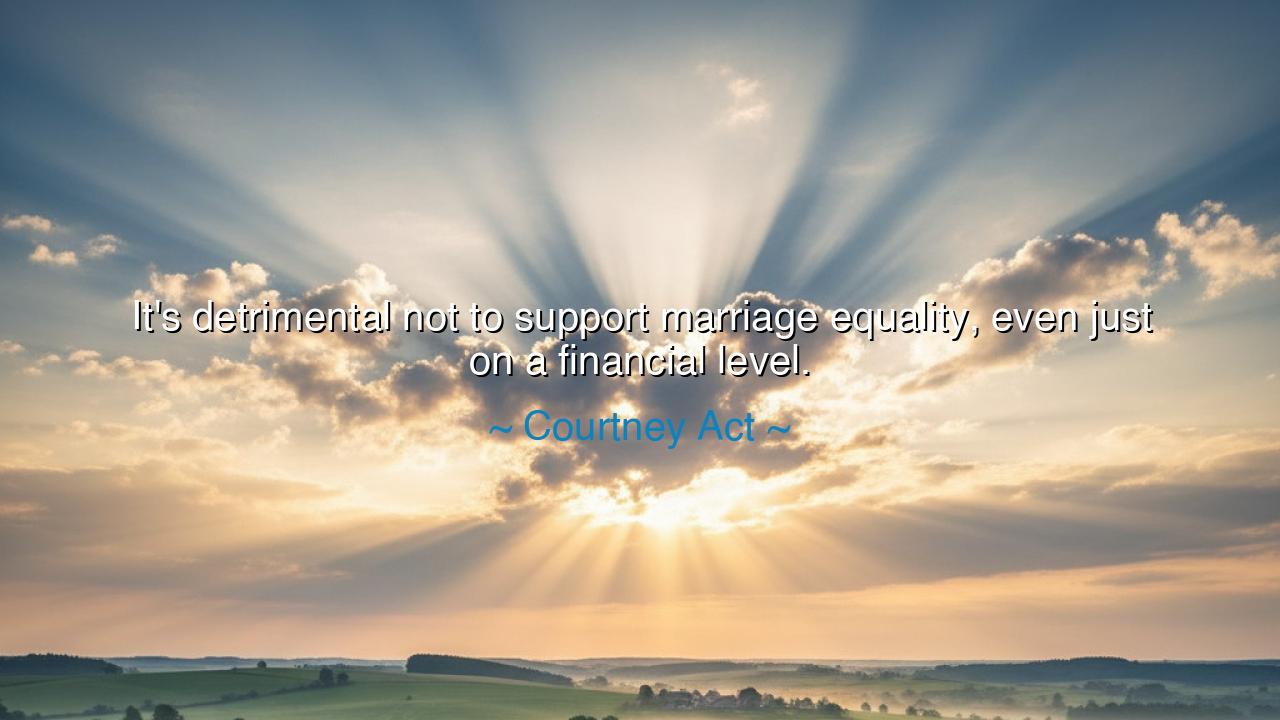
It's detrimental not to support marriage equality, even just on a






In the great journey of human civilization, the struggle for equality has always been a defining force, whether in the realms of law, morality, or society. Courtney Act, in her statement, “It’s detrimental not to support marriage equality, even just on a financial level,” highlights an essential truth: that the denial of rights—particularly the right to marriage—is not only a moral failure but a practical one, harming both individuals and society as a whole. To deny the fundamental right of marriage to any group is to weaken the very fabric of society itself, affecting not just the lives of the individuals involved, but the collective wellbeing of the community. Courtney Act’s words are a clarion call to understand that equality is not just a social ideal, but a financial necessity—a truth that transcends time and culture.
The ancients recognized the deep importance of justice and fairness in society, yet their understanding of marriage was often limited and reserved for certain classes or gender norms. Ancient Rome, for instance, celebrated the institution of marriage, but it was often an arrangement centered around political or economic gain rather than the personal rights of the individuals involved. The marriage between Octavian and Livia, for example, was not one born of romantic love but of political convenience. Marriage was viewed as a tool for strengthening alliances, securing power, and creating a stable society. Yet, the exclusion of certain groups from this institution, based on gender or sexual identity, reveals the flaw in this approach—a flaw that Courtney Act’s words call us to confront.
The notion that marriage equality is a financial issue is not as new as it may seem. Even in the ancient world, marriage was seen as a way to bring together wealth, land, and resources, creating stability and prosperity for the individuals involved. When the laws governing marriage are restrictive or discriminatory, they not only harm the individuals directly affected, but they also hinder the broader economy by excluding certain populations from fully participating in the economic systems of society. Just as the Romans understood that inclusive unions could provide greater stability and growth, so too do we understand that the exclusion of some from the rights of marriage stifles economic potential. By denying same-sex couples the right to marry, we are not just depriving them of legal recognition but are also removing them from the broader economic benefits that come with the institution of marriage.
Consider the case of ancient Greece, where the marriage between Plato and Socrates’ ideals of citizenship and economic welfare was often intertwined with the greater good of society. Plato viewed marriage as not only a personal union but also a social contract, essential for the stability of the state. Socrates, though a critic of certain societal structures, also understood that for a state to thrive, equality in the basic human rights of its citizens was essential. Courtney Act’s reflection on marriage equality echoes this same truth: when all individuals are given the ability to participate fully in society—whether through marriage or other forms of recognition—society as a whole flourishes, and its economic systems become more vibrant and inclusive.
Take, for example, the modern era, where studies have shown that same-sex couples who are allowed to marry experience economic benefits, not just in terms of legal recognition but in areas such as taxation, healthcare, and inheritance rights. When society denies these rights, it creates unnecessary financial barriers that harm both individuals and society at large. By recognizing and supporting marriage equality, we are not just acting out of compassion or justice; we are making a decision that benefits the economy, encouraging more stable relationships, and fostering growth and social cohesion. This is the practical wisdom that Courtney Act is urging us to embrace.
The lesson we must take from Courtney Act’s words is clear: equality is not just a moral imperative but a practical necessity. To deny marriage equality is to deny individuals their basic rights and to impose unnecessary economic costs on society as a whole. The ancients, for all their wisdom, were often blinded by social norms that excluded certain groups, but today we have the opportunity to correct these injustices. Marriage equality is not just about love or legal recognition; it is about economic growth, stability, and the prosperity of all citizens, regardless of their sexual orientation or identity.
In our own lives, let us take this truth to heart and strive to support equality in all its forms. Let us advocate for marriage equality as both a social and economic issue, understanding that when we fight for justice, we are not just fighting for the rights of individuals but for the flourishing of society itself. Let us also recognize that true progress is not merely about legal victories but about creating a society where everyone, regardless of their identity, has the freedom to live, love, and thrive—financially, socially, and emotionally. In this way, we not only honor the wisdom of the ancients but build a future that is more just, more inclusive, and more prosperous for all.






AAdministratorAdministrator
Welcome, honored guests. Please leave a comment, we will respond soon